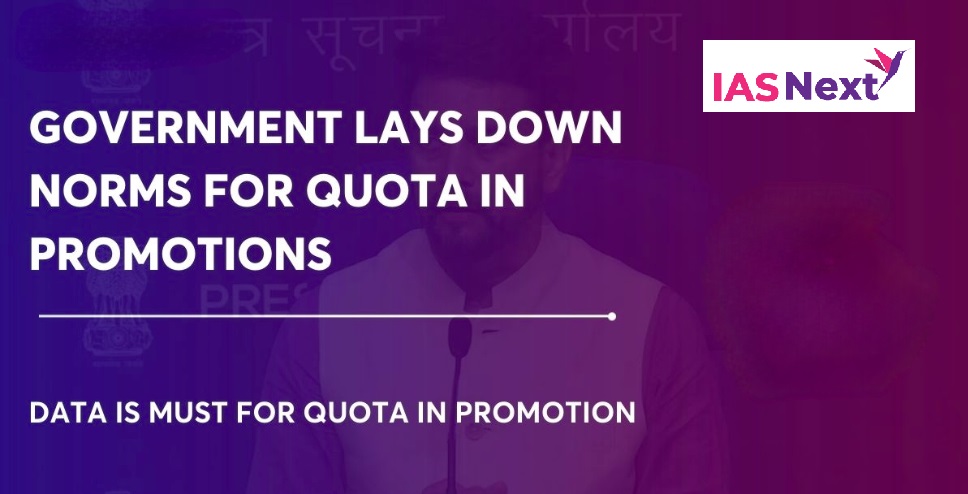CURRENT AFFAIRS
Get the most updated and recent current affair content on Padhaikaro.com
Government lays down norms for quota in promotions
- IAS NEXT, Lucknow
- 21, Apr 2022

Reference News:-
The Department of Personnel and Training (DoPT) has asked all departments of the Central Government to collect the data on inadequacy of representation of Scheduled Castes and Scheduled Tribes before implementing the policy of reservation in promotion in government offices.
Specified conditions:
The DoPT order has also specified conditions (Based on the Supreme Court verdict) to be met while implementing the policy of reservation in promotions.
The conditions include:
- Collection of quantifiable data regarding inadequacy of representation of SCs and STs.
- Application of this data to each cadre separately.
- If a roster exists, the unit for operation of the roster would be the cadre or which the quantifiable data would have to be collected and applied in regard to the filling up of the vacancies in the roster.
Reservations in promotions:
- Indra Sawhney Judgement (1992):
In November 1992, in the Indra Sawhney Judgement, popularly known as Mandal Judgement, a nine-judge bench of the Supreme Court decided that Article 16(4) of the Constitution did not provide for reservation in promotions.
- 77th Amendment Act:
To override the judgement and enable reservations in promotions, the Parliament, through the 77th Constitutional Amendment Act 1995, added a new clause in Article 16 i.e. Article 16(4A), making provision for reservation in promotions for SCs/STs.
- 85th Amendment Act:
The 85th Constitutional Amendment Act, 2001 was brought in for also giving consequential seniority to SCs and STs in matters of reservation in promotion.
- M. Nagraj v/s Union of India Judgement (2006):
The 77th and 85th Amendment in the Constitution were challenged by the General Category employees before a five-judge bench of the Supreme Court.
- The Court clubbed all these petitions challenging these amendments and gave its verdict in the case of M. Nagraj v/s Union of India in 2006.
- In its verdict, the Court validated Parliament’s decision to extend reservations for SCs/STs to include promotions (reservation in promotion).
Conditions for Providing Reservation in Promotions:
In the M. Nagraj Judgement, the Court laid down three conditions that the State must meet prior to granting a SC/ST a reservation in promotion.
- First, the State must show the backwardness of the class.
- Second, it must show that the class is inadequately represented in the position/service for which reservations in promotion will be granted.
- Finally, it must show that the reservations would not affect the overall efficiency of administration.
- Jarnail Singh Judgement (2018):
SC modified the Nagaraj judgement to the extent that State need not produce quantifiable data to prove the “backwardness” of SCs and STs before granting reservations.
- 2022 Judgement by the Supreme Court:
In January 2022, the Supreme Court held that collection of data to determine the inadequacy of representation of Scheduled Castes/Scheduled Tribes in Government jobs is necessary to grant reservation in promotions.
- The Court held that “cadre” and not class, group or the entire service as the unit for the purpose of collection of quantifiable data for giving promotion quotas.
- However, the Court has left it to the States and Central Government to assess the inadequacy of representation of SCs/STs to promotional posts taking into account relevant factors.
What is the significance of these norms?
This move is likely to benefit Central Secretariat Service(CSS) officials who have not been promoted for the past six years. The CSS comprises middle to senior management rank officials in various Ministries.